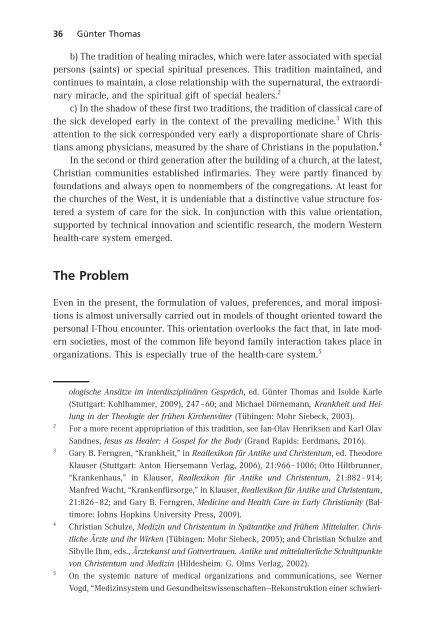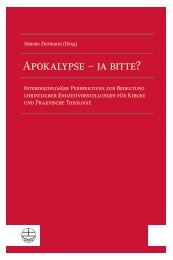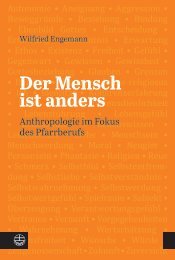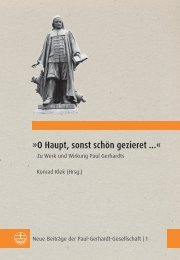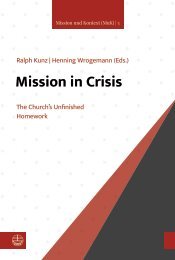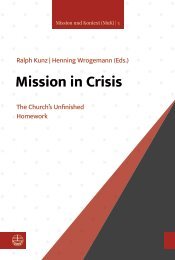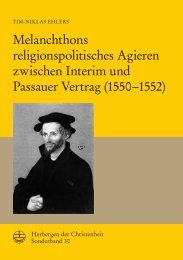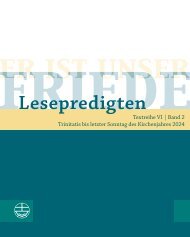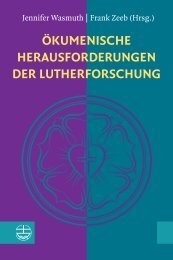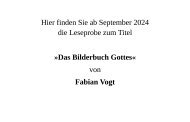Michael Welker | Eva Winkler | John Witte, Jr. | Stephen Pickard (Eds.): The Impact of Health Care (Leseprobe)
Pluralism has become the defining characteristic of many modern societies. Not only a plurality of individual and social claims and activities gain impacts on societal life. A creative pluralism of institutions and their norms profoundly shape our moral commitments and character – notably the family, the market, the media, and systems of law, religion, politics, research, education, health care, and defense. In the theoretical, empirical, and historical contributions to this volume, specialists on medicine, medical ethics, psychology, theology and health care discuss the many challenges that major transformations in their areas of expertise pose to the communication and orientation in late modern pluralistic societies. Contributors come from Germany, the USA and Australia.
Pluralism has become the defining characteristic of many modern societies. Not only a plurality of individual and social claims and activities gain impacts on societal life. A creative pluralism of institutions and their norms profoundly shape our moral commitments and character – notably the family, the market, the media, and systems of law, religion, politics, research, education, health care, and defense.
In the theoretical, empirical, and historical contributions to this volume, specialists on medicine, medical ethics, psychology, theology and health care discuss the many challenges that major transformations in their areas of expertise pose to the communication and orientation in late modern pluralistic societies. Contributors come from Germany, the USA and Australia.
You also want an ePaper? Increase the reach of your titles
YUMPU automatically turns print PDFs into web optimized ePapers that Google loves.
36 Günter Thomas<br />
b) <strong>The</strong> tradition <strong>of</strong> healing miracles, which were later associated withspecial<br />
persons (saints) or special spiritual presences. This tradition maintained, and<br />
continues to maintain, aclose relationship with the supernatural, the extraordinary<br />
miracle, and the spiritual gift <strong>of</strong>special healers. 2<br />
c) In the shadow <strong>of</strong> these first two traditions, the tradition <strong>of</strong> classical care <strong>of</strong><br />
the sick developed early in the context <strong>of</strong> the prevailing medicine. 3 With this<br />
attention to the sick corresponded very early adisproportionate share <strong>of</strong> Christians<br />
amongphysicians, measured by the share <strong>of</strong> Christians in the population. 4<br />
In the second or third generation after the building <strong>of</strong> achurch,atthe latest,<br />
Christian communities established infirmaries. <strong>The</strong>y were partly financed by<br />
foundations and always open to nonmembers <strong>of</strong> the congregations. At least for<br />
the churches <strong>of</strong> the West, it is undeniable that adistinctive value structure fostered<br />
asystem <strong>of</strong> care for the sick. In conjunction with this value orientation,<br />
supported by technical innovation and scientific research, the modern Western<br />
health-care system emerged.<br />
<strong>The</strong> Problem<br />
Even in the present, the formulation <strong>of</strong> values, preferences, and moral impositions<br />
is almost universally carried out in models <strong>of</strong> thought oriented toward the<br />
personal I-Thou encounter. This orientation overlooks the fact that, in late modern<br />
societies, most <strong>of</strong> the common life beyond family interaction takes place in<br />
organizations. This is especially true <strong>of</strong> the health-care system. 5<br />
2<br />
3<br />
4<br />
5<br />
ologische Ansätze im interdisziplinären Gespräch, ed. Günter Thomas and Isolde Karle<br />
(Stuttgart: Kohlhammer, 2009), 247–60; and <strong>Michael</strong> Dörnemann, Krankheit und Heilung<br />
in der <strong>The</strong>ologie der frühen Kirchenväter (Tübingen: Mohr Siebeck, 2003).<br />
For amore recent appropriation <strong>of</strong> this tradition, see Jan-Olav Henriksen and Karl Olav<br />
Sandnes, Jesus as Healer: AGospel for the Body (Grand Rapids: Eerdmans, 2016).<br />
Gary B. Ferngren, “Krankheit,” in Reallexikon für Antike und Christentum, ed. <strong>The</strong>odore<br />
Klauser (Stuttgart: Anton Hiersemann Verlag, 2006), 21:966–1006; Otto Hiltbrunner,<br />
“Krankenhaus,” in Klauser, Reallexikon für Antike und Christentum, 21:882–914;<br />
Manfred Wacht, “Krankenfürsorge,” in Klauser, Reallexikon für Antike und Christentum,<br />
21:826–82; and Gary B. Ferngren, Medicine and <strong>Health</strong> <strong>Care</strong> in Early Christianity (Baltimore:<br />
<strong>John</strong>s Hopkins University Press, 2009).<br />
Christian Schulze, Medizin und Christentum in Spätantike und frühem Mittelalter. Christliche<br />
Ärzte und ihr Wirken (Tübingen: Mohr Siebeck, 2005); and Christian Schulze and<br />
Sibylle Ihm, eds., Ärztekunst und Gottvertrauen. Antike und mittelalterliche Schnittpunkte<br />
von Christentum und Medizin (Hildesheim: G. Olms Verlag, 2002).<br />
On the systemic nature <strong>of</strong> medical organizations and communications, see Werner<br />
Vogd, “Medizinsystem und Gesundheitswissenschaften—Rekonstruktion einer schwieri-


